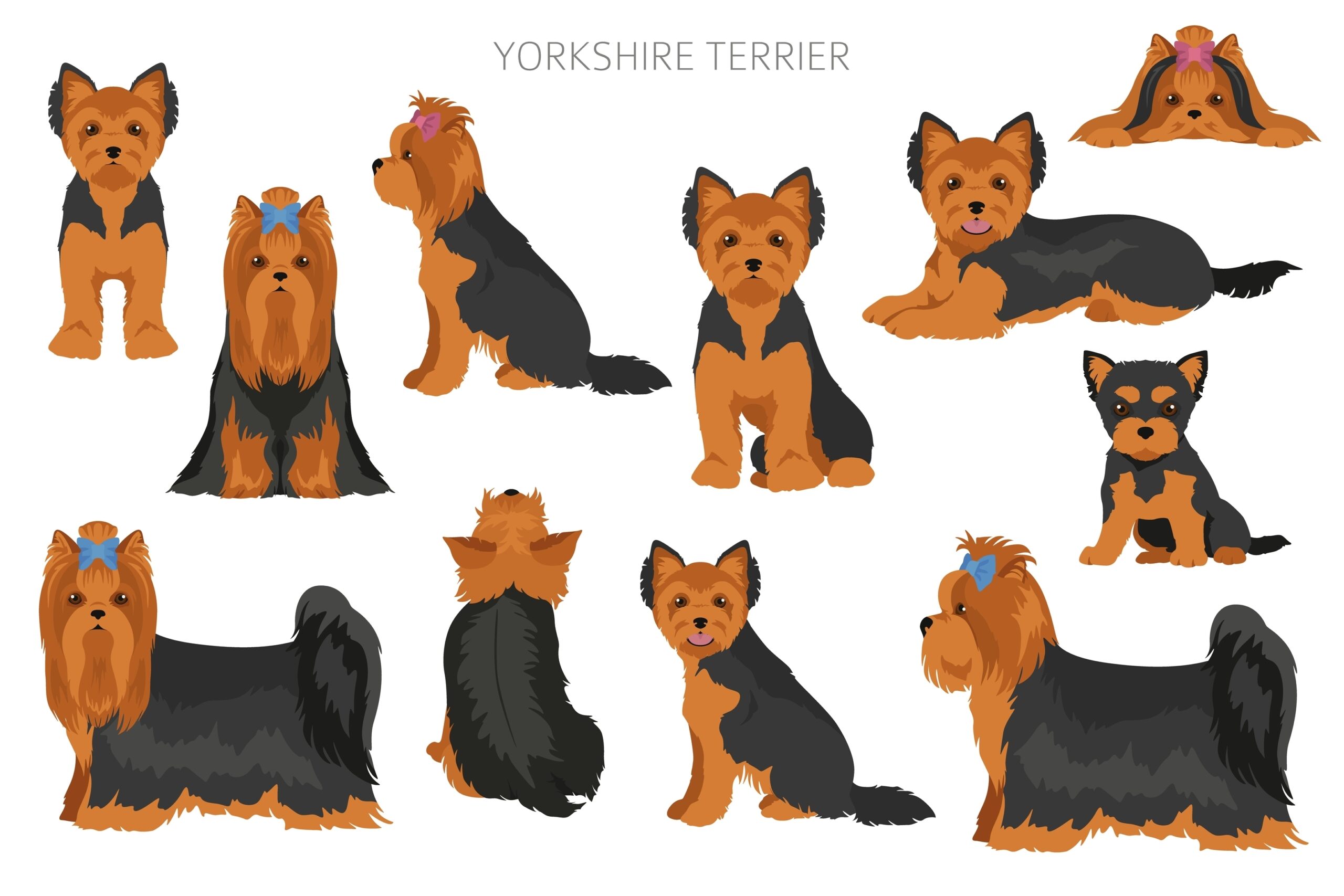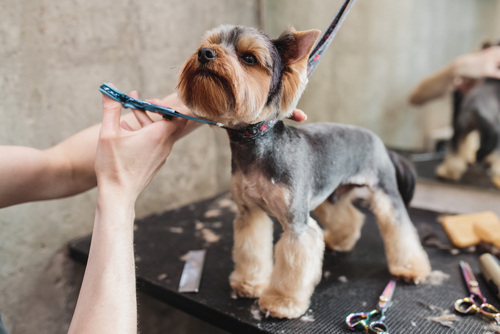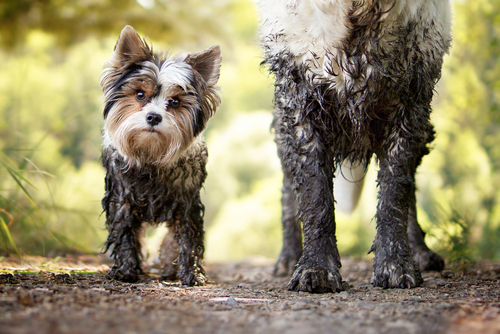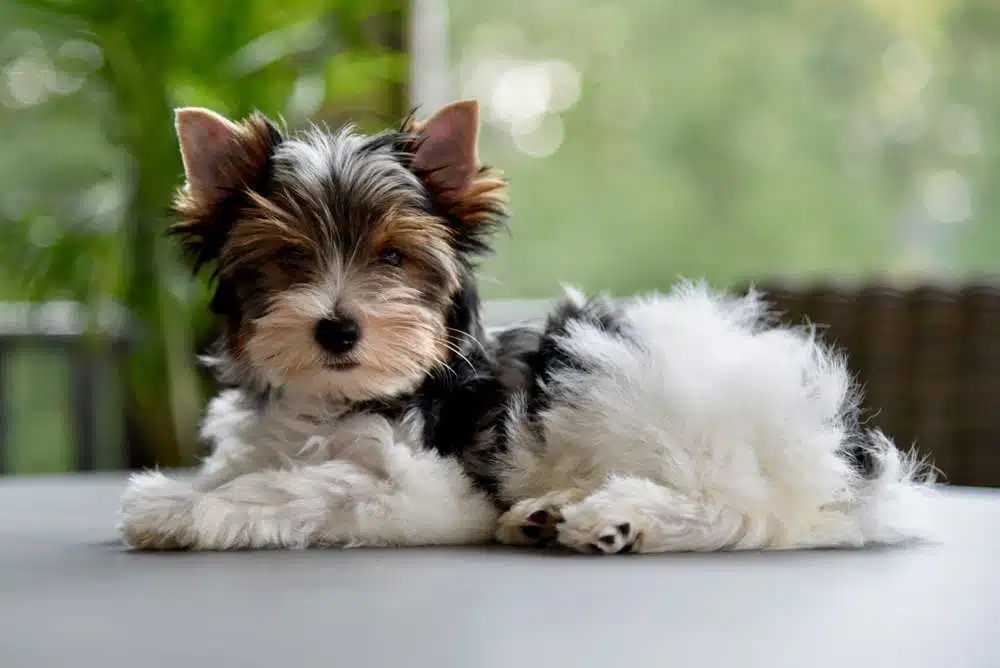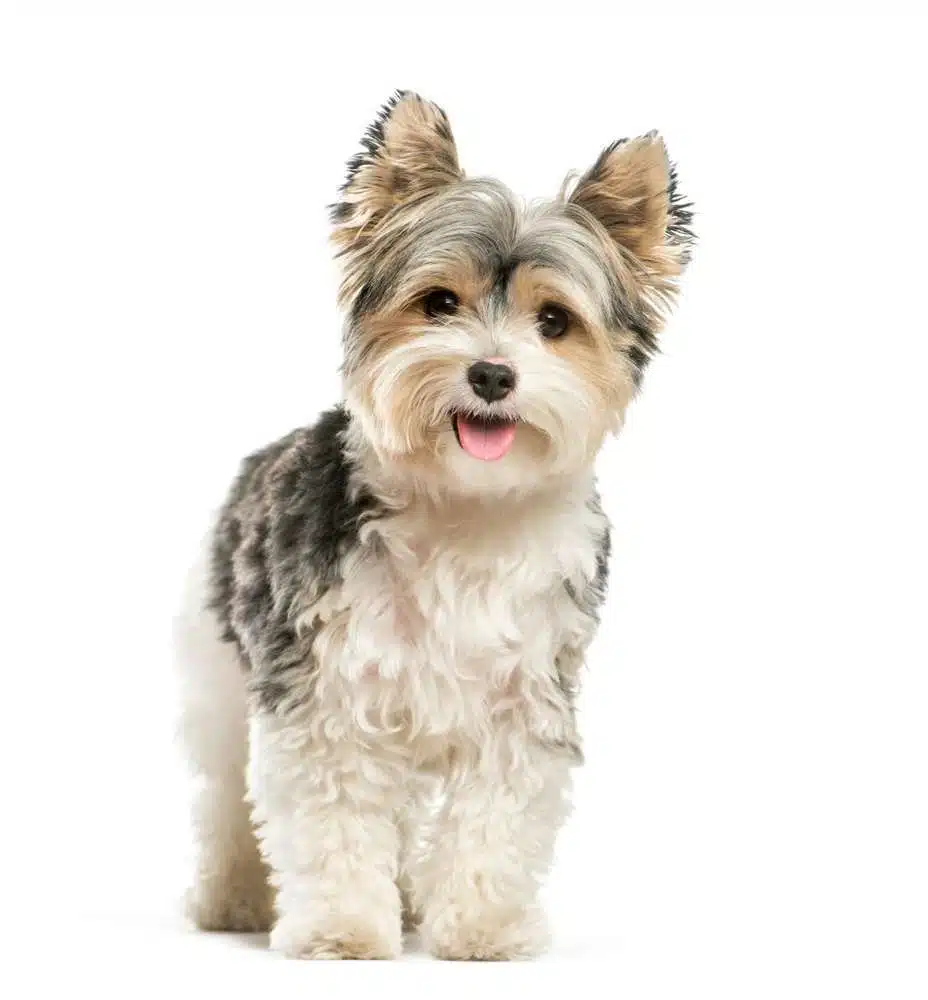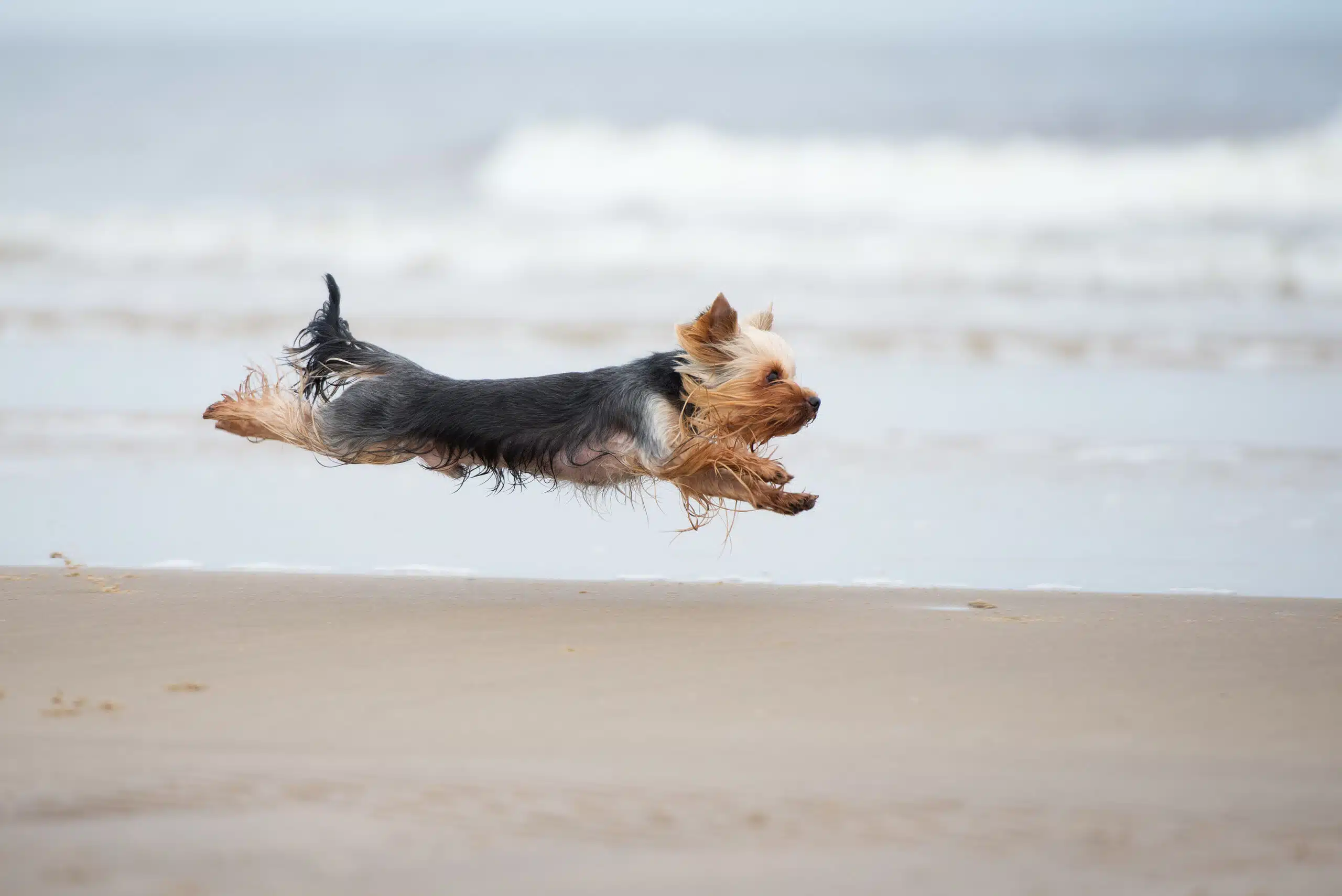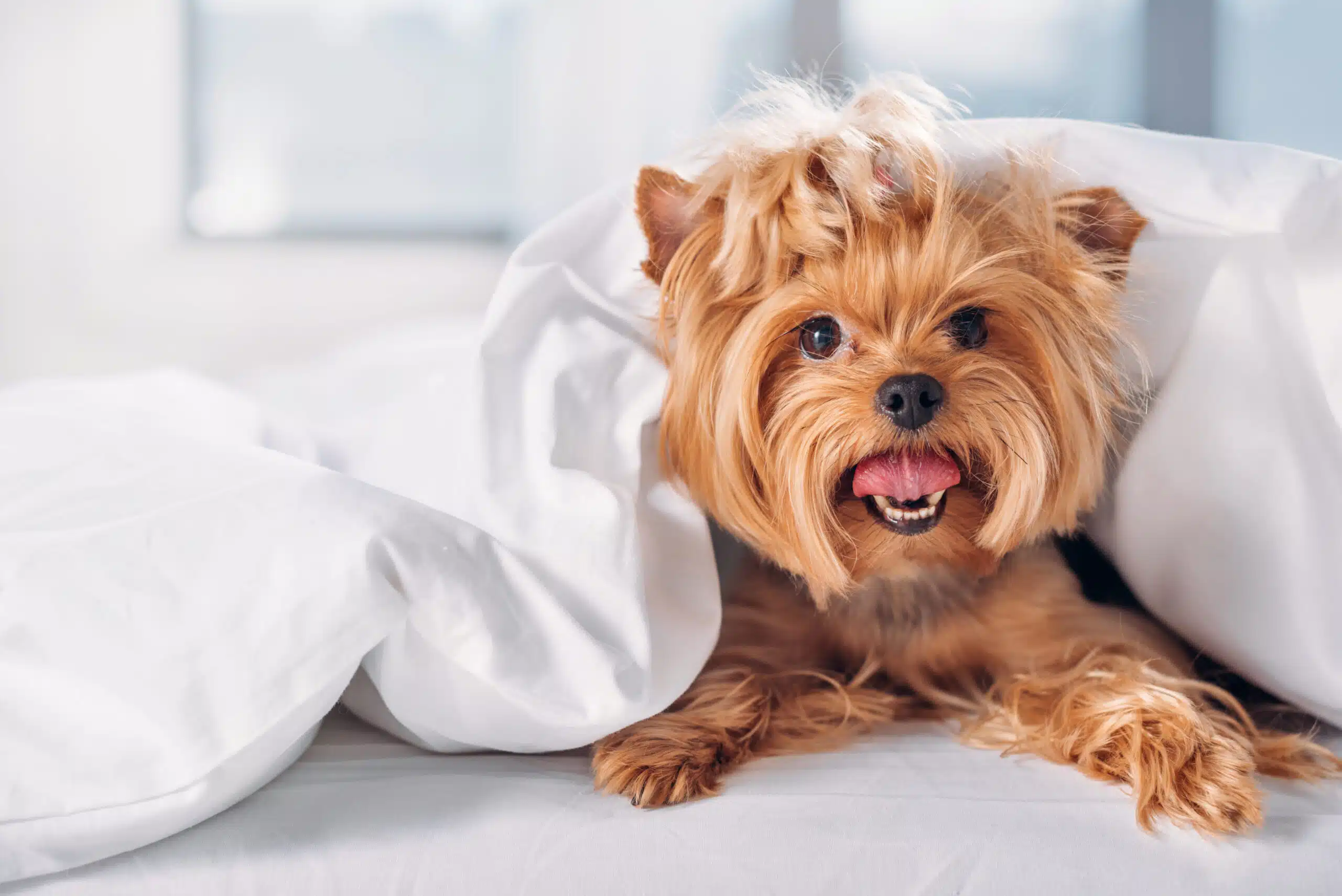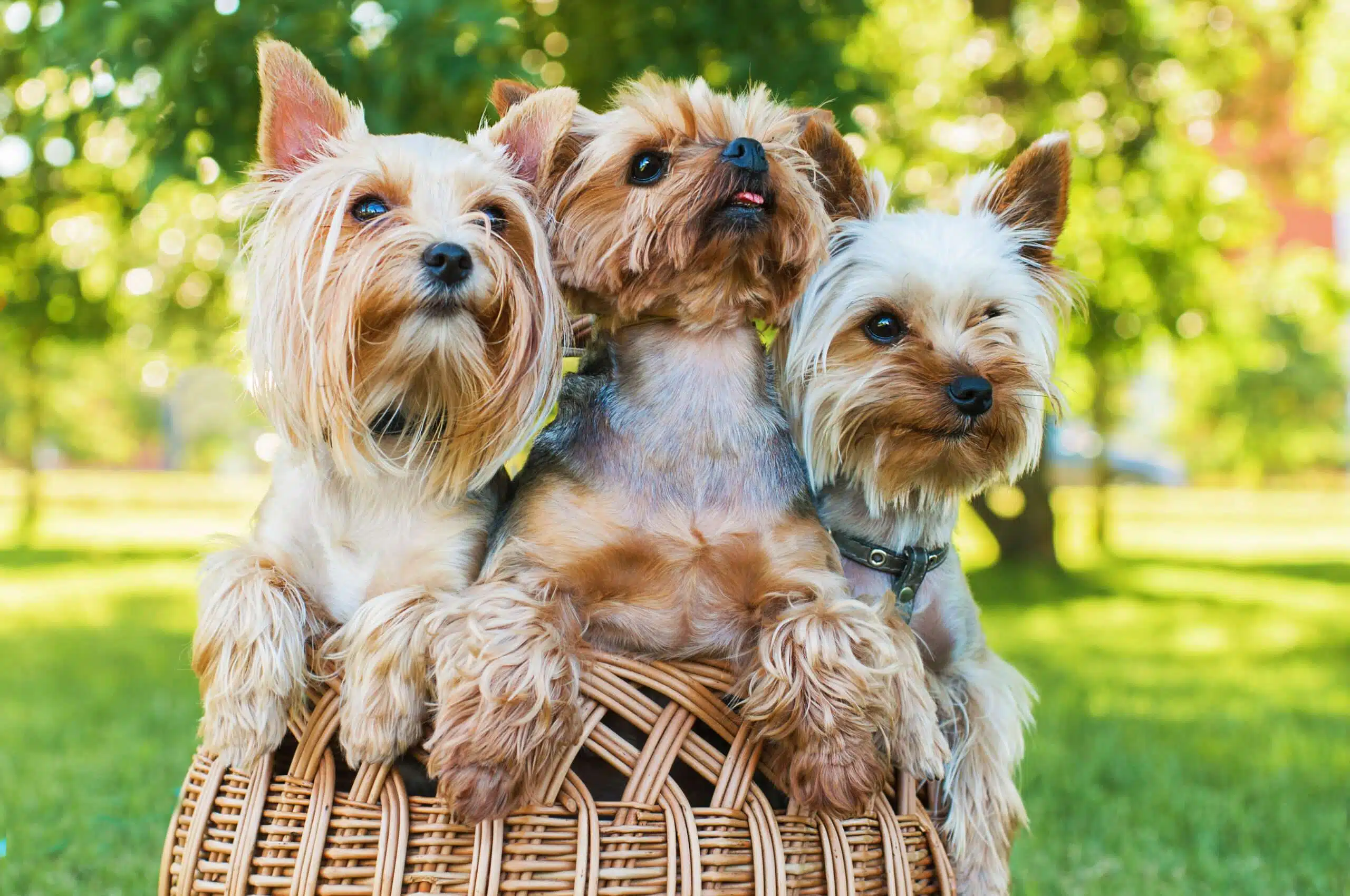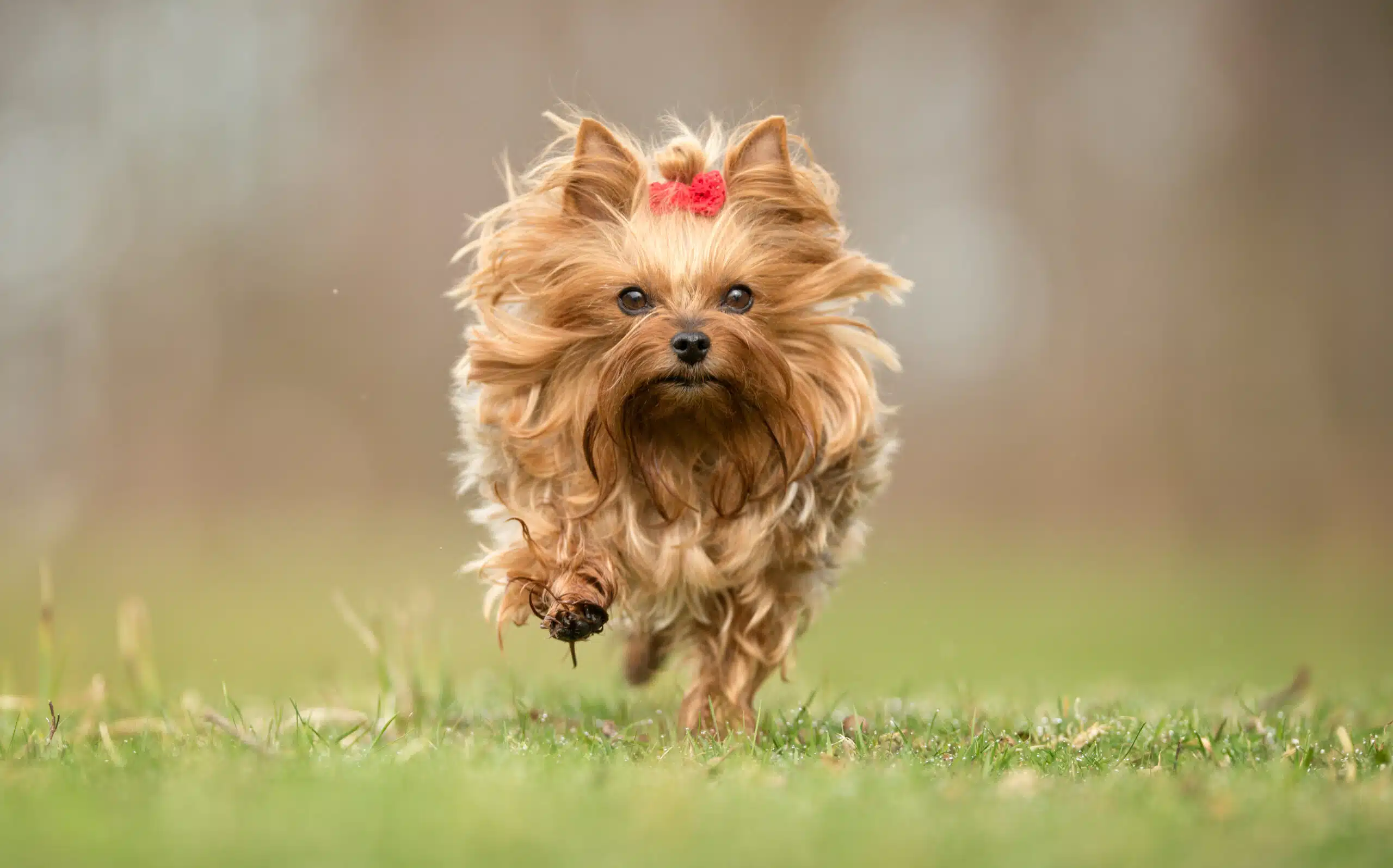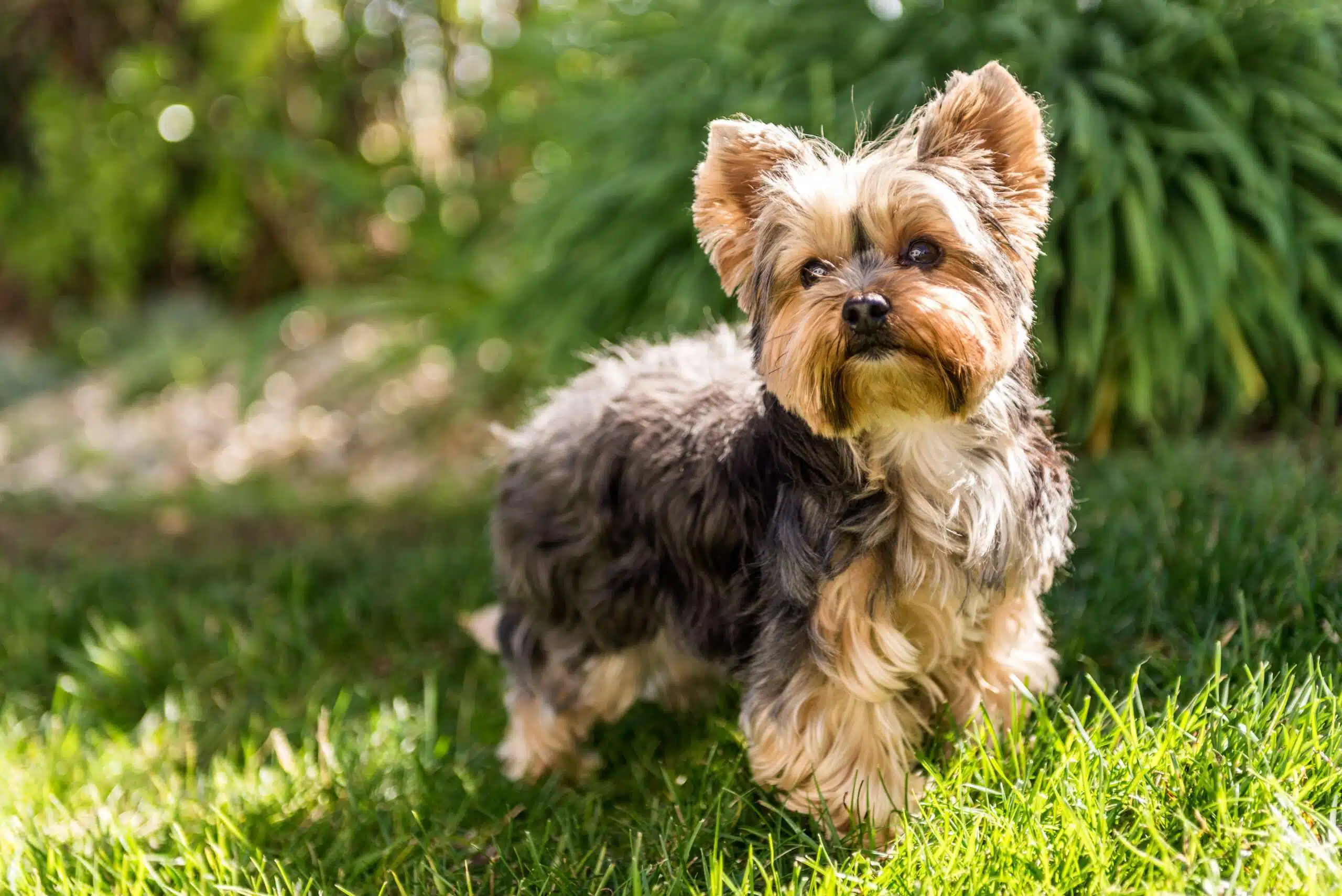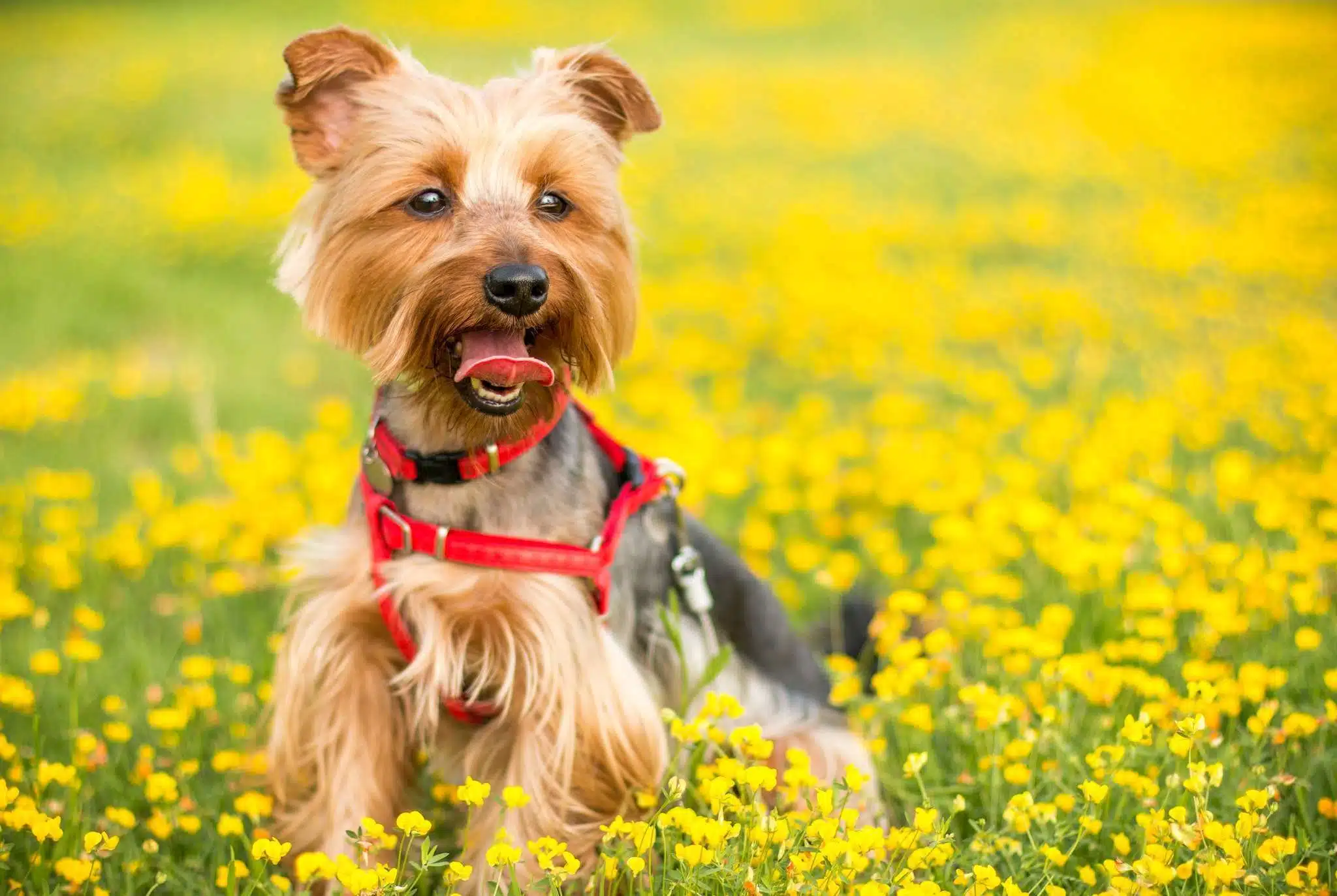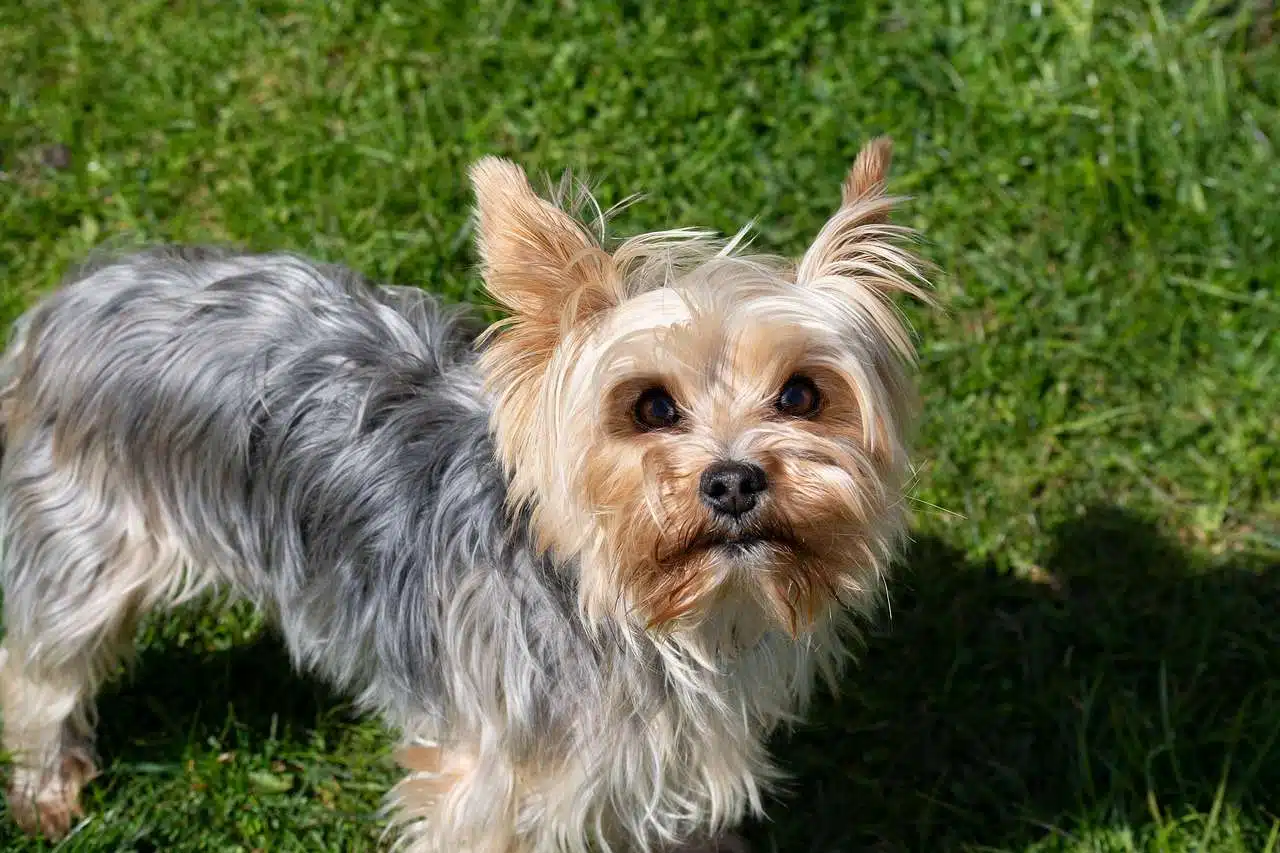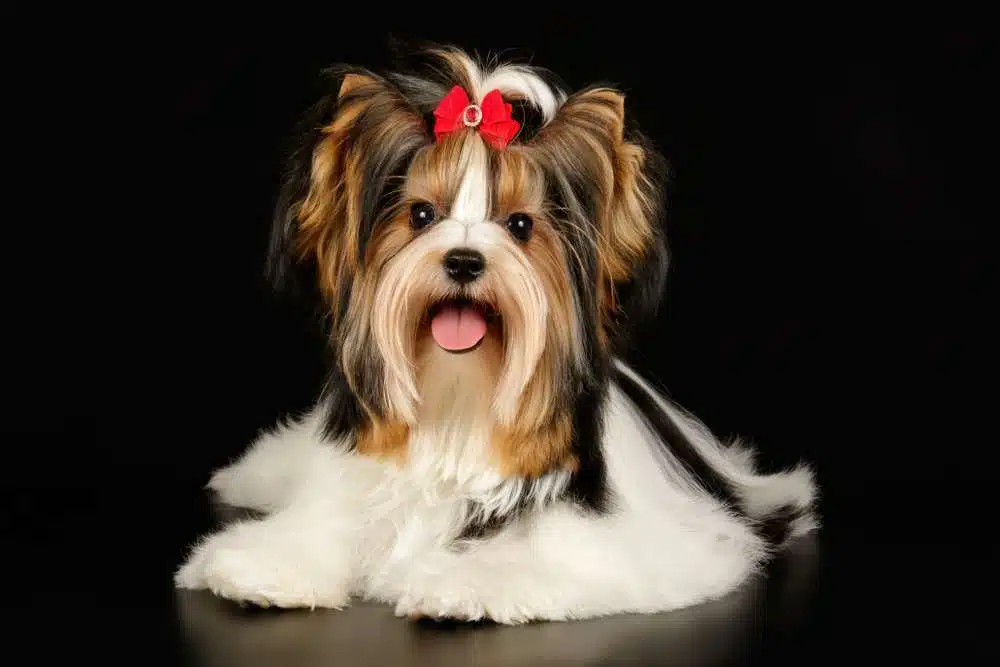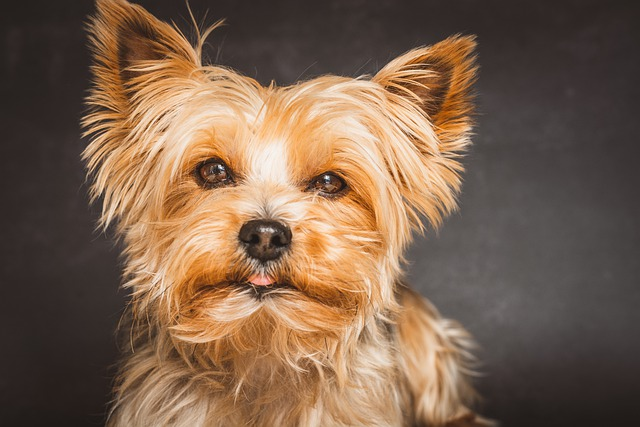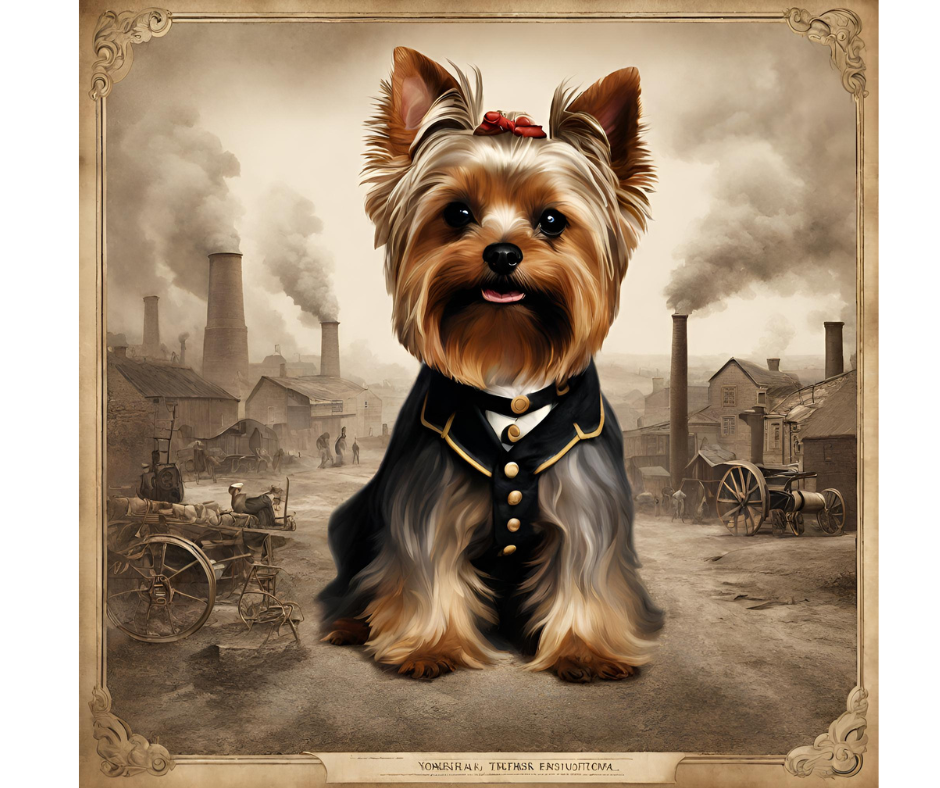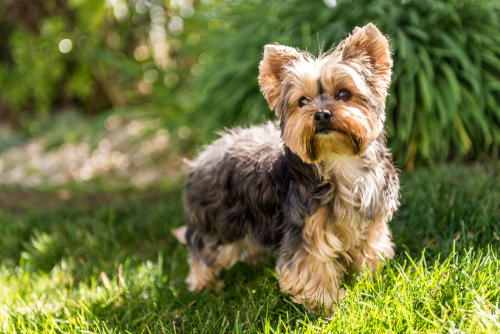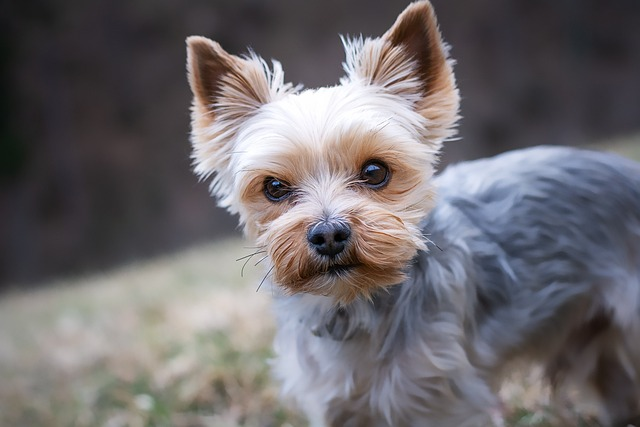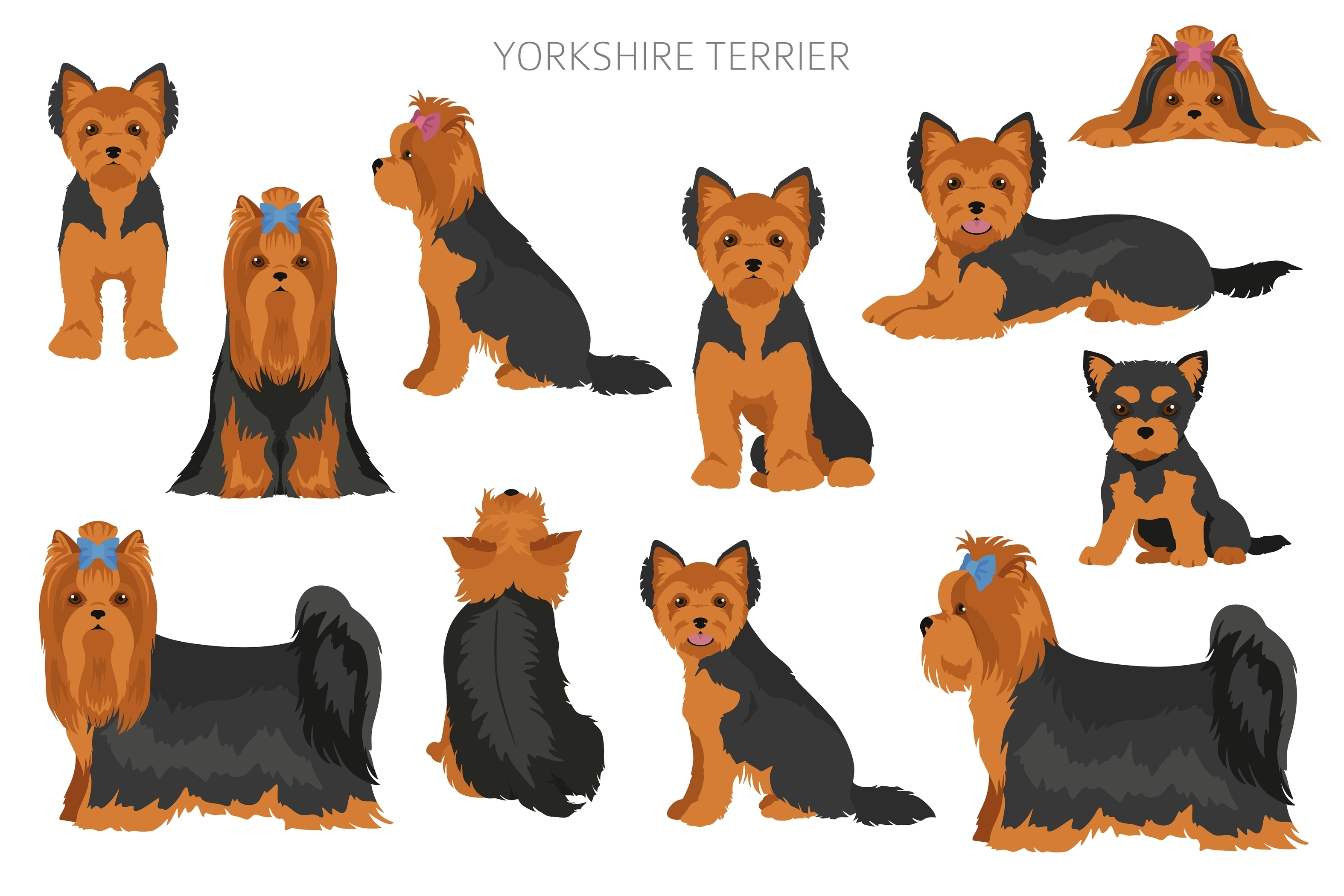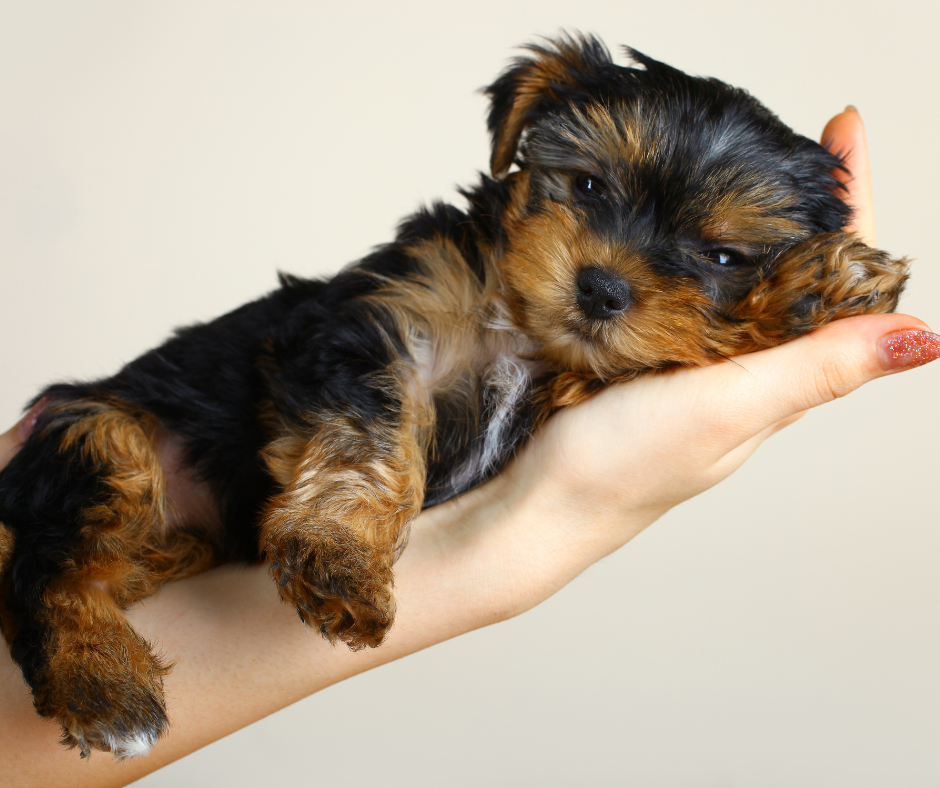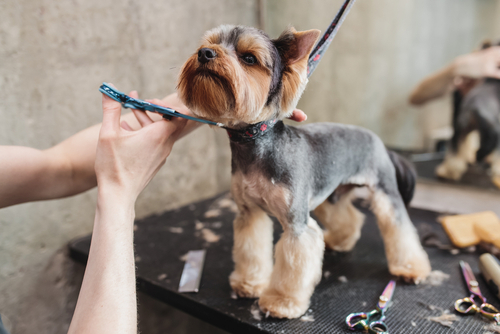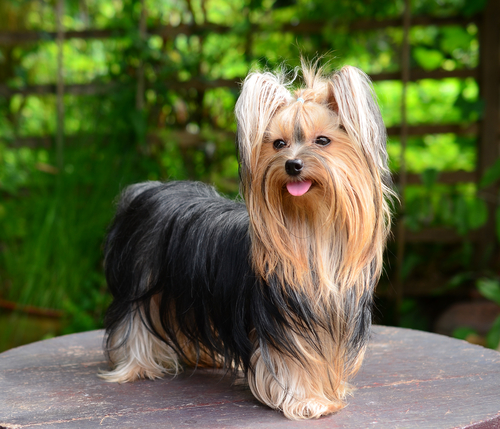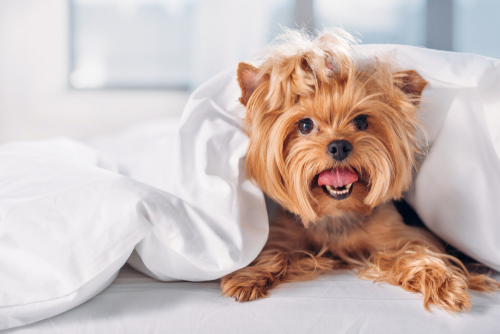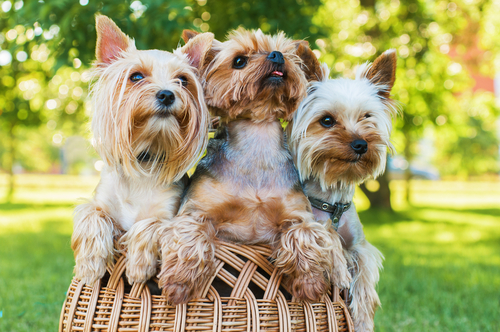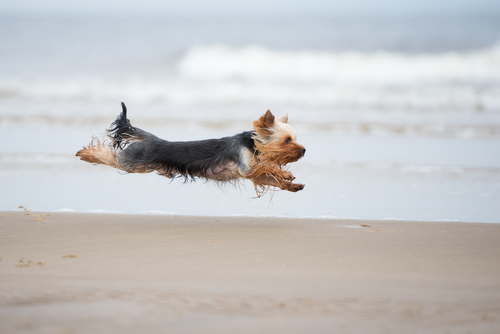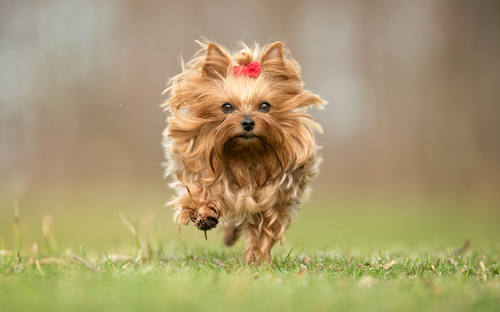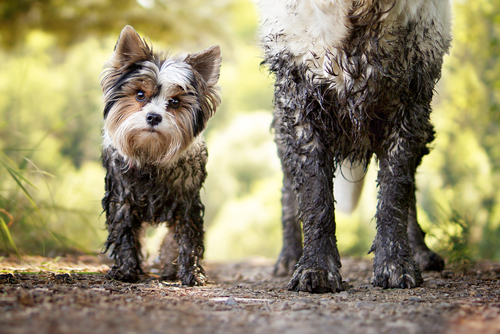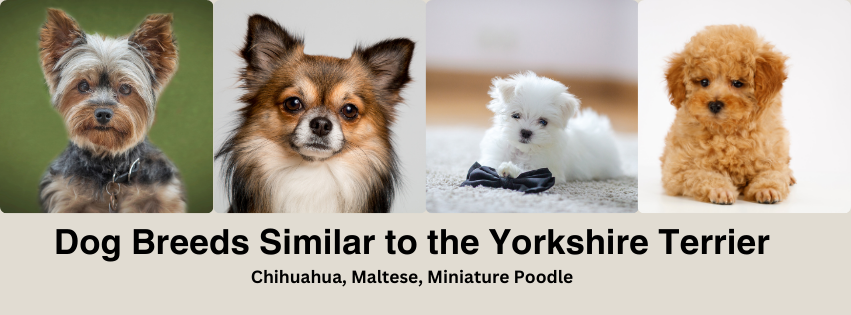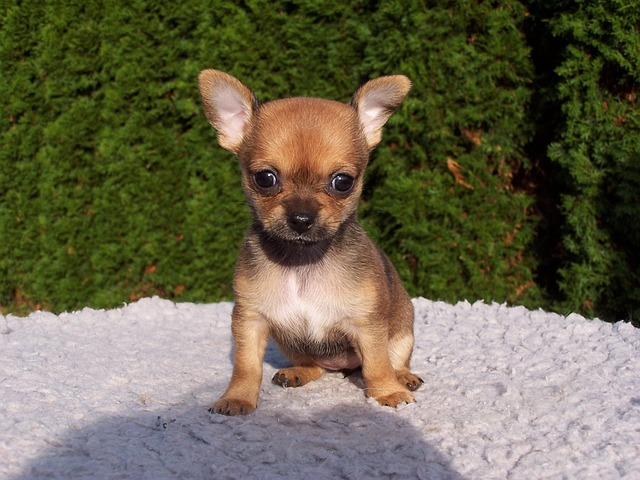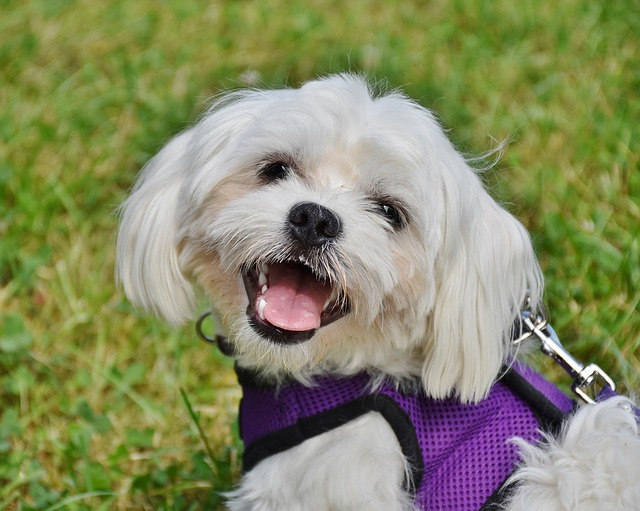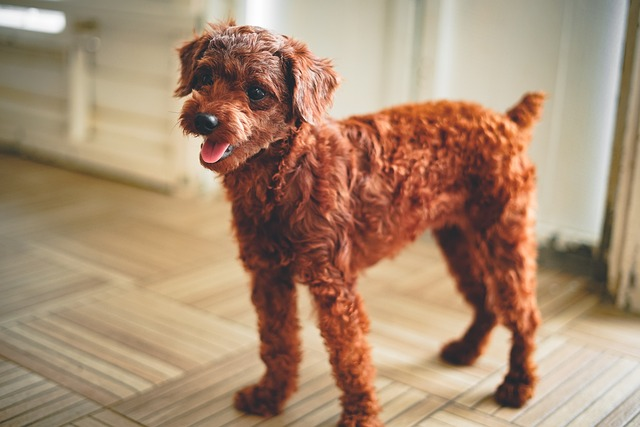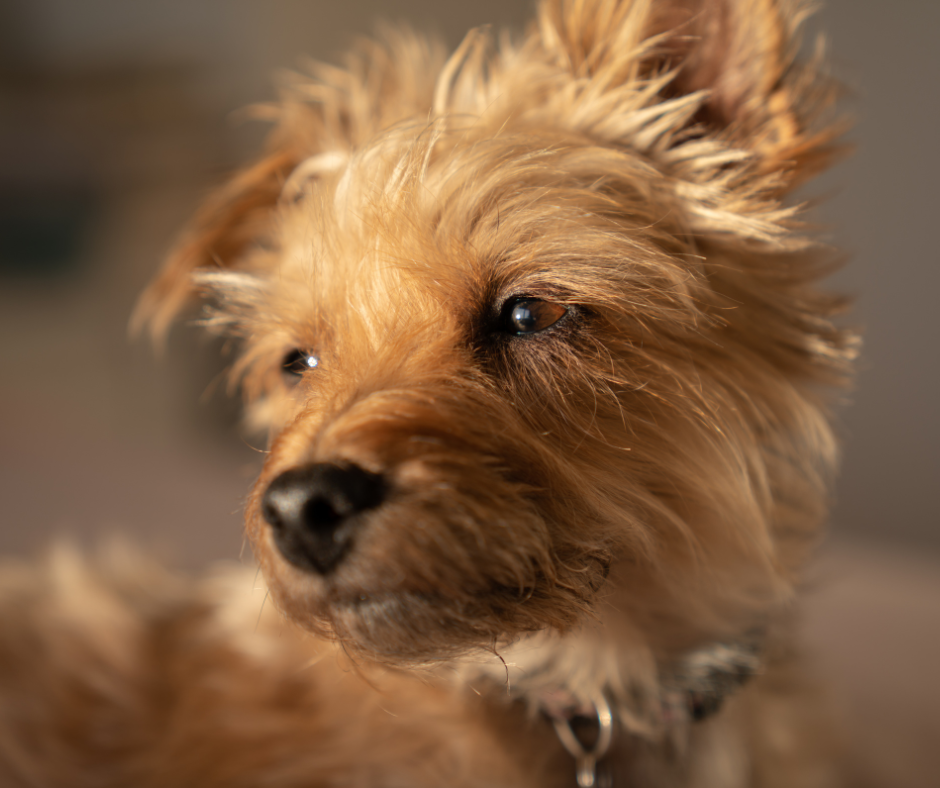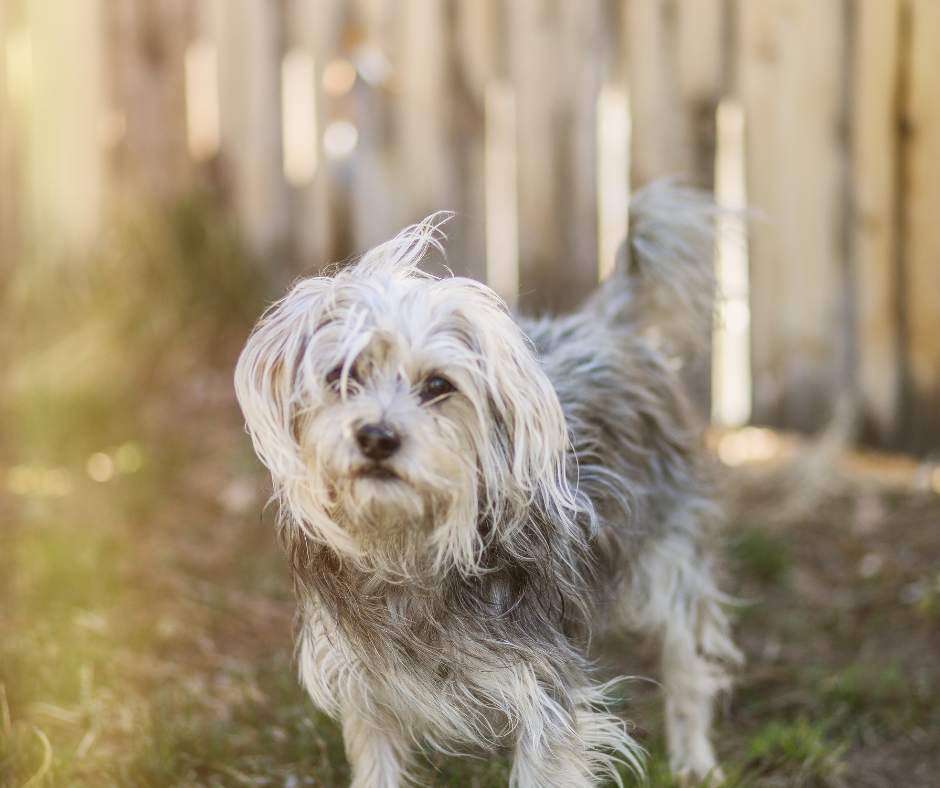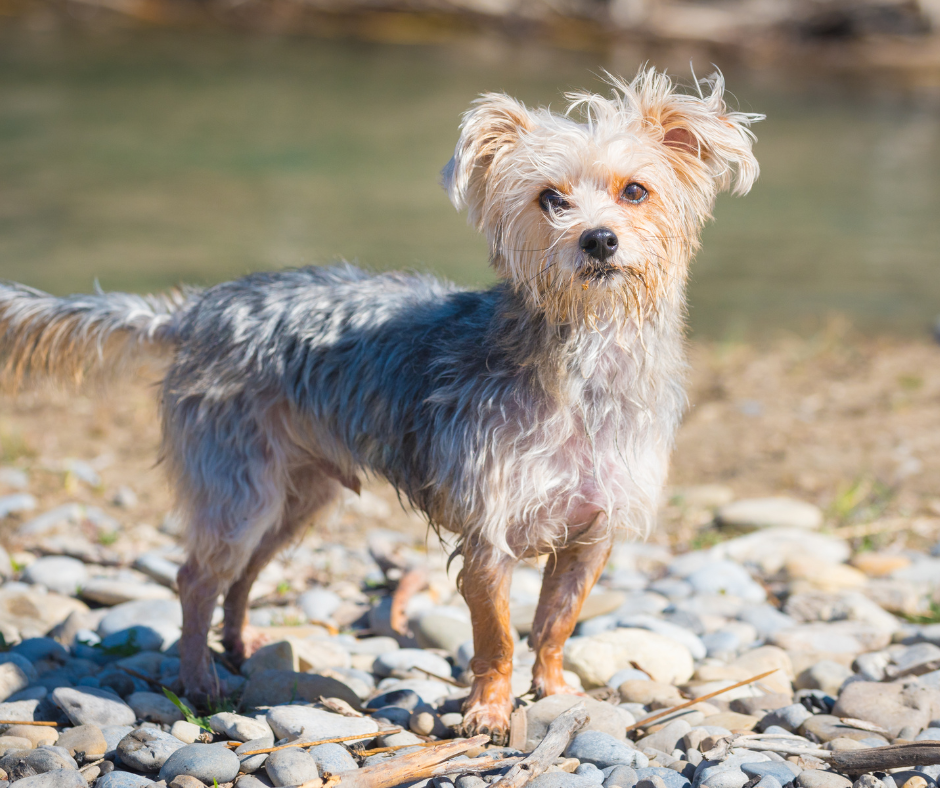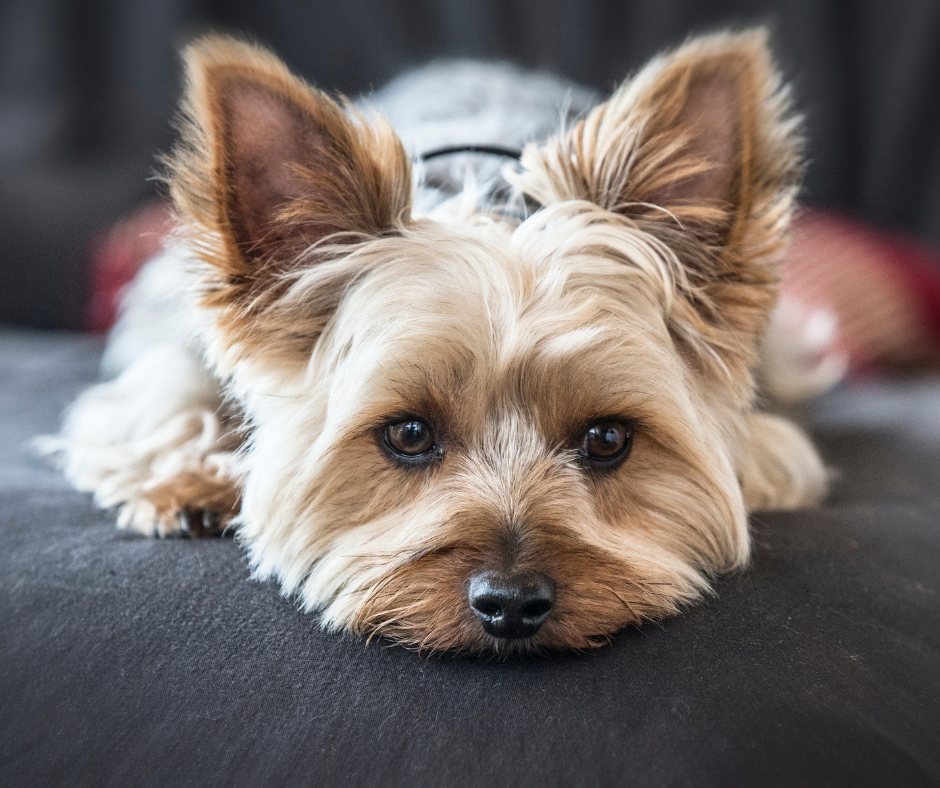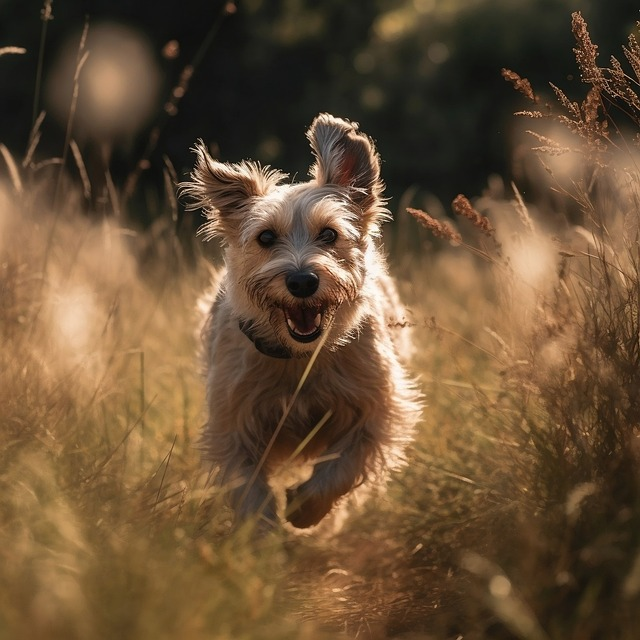Yorkshire Terrier
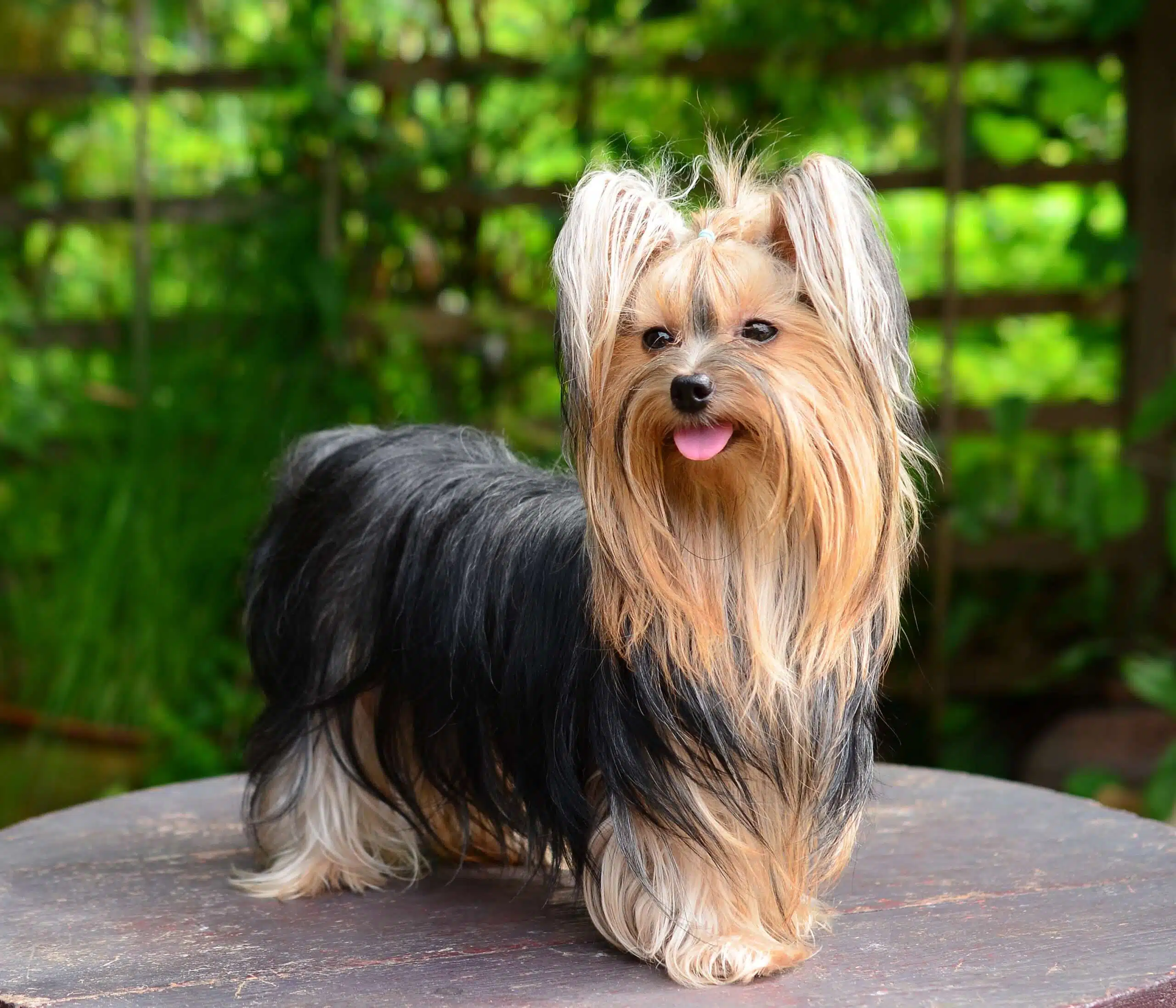
The Yorkshire Terrier’s bold character traces back to its ancestors, the now-extinct Clydesdale Terrier and Black-and-Tan Terrier. Scottish weavers brought these dogs to cities like York, Manchester, and Leeds during financial hardships, eventually crossing them with local breeds. This breeding produced a small yet brave dog known for its striking blue and gold coat.
Despite its Toy dog classification, the Yorkie exhibits a robust terrier spirit, marked by spunk and intelligence. It is playful and capable of holding its own against larger dogs, though it does require meticulous grooming, regardless of coat length.
Yorkies are often stereotyped as the pets of affluent, elderly women, but their appeal extends across a diverse range of dog lovers. Their button-like eyes and silky coat make them irresistible.
These dogs are intelligent and trainable, with the spirit of a large dog packed into a body that generally weighs no more than seven pounds. They need regular outdoor exercise and are surprisingly effective as vigilant guards, albeit noisy ones.
However, Yorkies are not suited for households with young children due to their size and sharp reactions. They can be challenging with potty training and need consistent, systematic training to manage their natural tendency to bark.
Training a Yorkie is relatively straightforward as they are eager to please, but without proper guidance, they can develop undesirable behaviors. Consistency and patience in training can prevent these issues and promote good behavior.
Yorkies don’t need extensive physical activity; about 30-45 minutes of walking daily suffices. They also enjoy playing with toys or running in a garden if available.
The breed is known for its luxurious, silky coat, which looks its best when it shimmers under light and hangs straight from nose to tail. Maintaining this majestic mane involves daily brushing and regular baths, especially if kept long.
Yorkshire Terrier: An Overview
The Yorkshire Terrier breed, affectionately known as the Yorkie, holds a cherished spot in the panorama of small dog breeds, captivating the hearts of dog enthusiasts worldwide with its diminutive stature and dynamic personality. Originating from the historical region of Yorkshire in England during the 19th century, these dogs were initially bred to catch rats in the burgeoning mills of the Industrial Revolution. However, their undeniable charm and beautiful appearance quickly elevated them from industrial exterminators to beloved companions of the Victorian elite, and subsequently to one of the most popular breeds across the globe.
Key Attributes of the Yorkshire Terrier
Historical Significance
- Origin: Born in Yorkshire, England during the 19th century, the Yorkshire Terrier initially served as a rat catcher in mills during the Industrial Revolution.
- Evolution: Quickly transitioning from working-class ratters to companions of the Victorian elite, Yorkies have ascended to become one of the most popular dog breeds globally.
Physical and Temperamental Traits
- Stature and Personality: Despite their small size, Yorkshire Terriers exude a big personality, characterized by vivacity, affection, and an almost comical self-importance.
- Coat and Color: Known for their luxurious, silky coats requiring regular grooming, Yorkies sport a distinctive blue and tan color that matures as they age.
Role in Modern Homes
- Versatility: Adaptable to various living situations, from urban apartments to family homes, Yorkies are as comfortable in a lap as they are on a show circuit.
- Companionship Quality: With their expressive eyes and compact build, they not only win beauty contests but also hearts, offering robust companionship in a tiny, elegant package.
Lasting Appeal
- Endearing Qualities: The blend of their historical background, striking appearance, and dynamic personality makes Yorkies uniquely appealing as lifelong companions.
- Impact on Owners: Embarking on the journey with a Yorkshire Terrier Puppy allows owners to experience a mix of luxury and loving companionship, highlighting their status not just as pets, but as true family members.
History and Origin of the Yorkshire Terrier
Early Beginnings
The Yorkshire Terrier dog breed, affectionately known as the Yorkie, originated in the 19th century in the county of Yorkshire, England. The breed was developed during the Industrial Revolution when Scottish workers migrated to Yorkshire, bringing with them several varieties of small terriers. Breeding these dogs with local types, such as the long-haired Leeds Terrier, led to the creation of the Yorkshire Terrier.
Purpose and Popularity
Initially, Yorkies were bred to catch rats in the burgeoning mills and mines of the industrial landscape. Their small size allowed them to be adept at this task, squeezing into places where larger dogs could not go. However, their striking looks and vibrant personality soon caught the eye of the upper classes, and by the late 1800s, Yorkshire Terriers had transitioned from being practical working dogs to becoming a beloved companion animal and a fashionable lapdog for Victorian ladies.
Development of the Breed
The exact breeds that made up the early Yorkie are not well-documented, but it’s believed that the Waterside Terrier, the Clydesdale Terrier, the broken-haired Scotch Terrier, and the Maltese were all contributors. One of the earliest and most famous Yorkshire Terriers was a dog named Huddersfield Ben, born in 1865, who is considered to be the father of the modern Yorkie. His fine appearance and winning ways in dog shows helped set the breed standards that would define Yorkshire Terriers.
Recognition and Evolution
The Yorkshire Terrier was recognized by the Kennel Club in England in 1886, and it wasn’t long before the breed made its way to the United States. The American Kennel Club (AKC) registered its first Yorkie in 1885. Since then, the breed has steadily grown in popularity across the world. In the U.S., it has consistently ranked as one of the most popular dog breeds and is maintained by the Yorkshire Terrier Club.
Read More: Guide to Dog Clubs for Dog Owners
Modern-Day Yorkies
Today, Yorkshire Terriers are known far more for their companionship than their original rodent-catching abilities. They are cherished for their small size, their bold and confident demeanor, and their luxurious blue and tan coats. Despite their diminutive stature, they maintain the hardy nature of their ancestors and are beloved pets in households around the globe.
Cultural Impact
Yorkies have made a significant cultural impact as well, often appearing in the media and being the pet of choice for numerous celebrities. Their elegant appearance and spirited character have made them symbols of both luxury and feisty companionship.
From humble beginnings to high society, the history of the Yorkshire Terrier is a fascinating journey of a breed that has captured the hearts of people worldwide. Their origin story not only highlights their adaptability and charm but also mirrors the societal changes of their time, showing how deeply intertwined our histories are with those of our beloved pets.
Read More: A Comprehensive History of Dogs
Physical Characteristics
Let us now delve into the physical characteristics that define the Yorkshire Terrier, often abbreviated as the Yorkie. This breed is renowned not only for its vibrant personality but also for its distinctive physical traits. Understanding these features will provide potential owners and enthusiasts with a deeper appreciation of what makes Yorkies so unique and beloved among small breeds. Yorkshire Terriers belong to the category of toy breeds, which are known for their compact size, spirited nature, and specific care needs, including exercise, training challenges, and attention to potential health issues like injury and liver shunt.
Size and Structure of Yorkshire Terrier Puppies:
Yorkshire Terriers are classified under the toy group, typically weighing in at approximately 4 to 7 pounds, though some individuals may fall slightly below or above this range. They generally stand about 7 to 8 inches tall at the shoulders. Their compact size makes them perfect companions for apartment living and for people who prefer a small, manageable dog that is easy to carry around.
Coat Texture and Length:
One of the most striking features of a Yorkshire Terrier is its coat. Yorkies boast one of the most unique coat textures in the canine world. Their hair is fine, silky, and straight, much like human hair, which sets them apart from other breeds with woollier or coarser fur. The length of this amazing dog’s coat is usually long, especially on the body, and can touch the ground if left untrimmed. This glamorous coat does not only serve aesthetic purposes but also provides a very practical coverage that protects them from the cold.
Coloration:
Yorkshire Terriers are known for their beautiful and unique coat colors. Puppies are born black and tan, which gradually lightens up and attains its mature colors as they grow. For adult Yorkshire Terriers, the ideal coat color evolves into a dark grey to black, with the blue color not being the typical blue but rather a diluted black that gives a dark steel blue appearance.
It’s crucial for adult dogs to exhibit no black hairs intermingled with the tan-colored fur, ensuring a clear distinction between the two colors. The face, chest, and legs of adult Yorkshire Terriers are brightly adorned with a rich tan, each strand of hair having a golden glow at the base which shades into a lighter tan at the tips, highlighting the importance of coat quality and texture. Regular brushing is essential to maintain the long, silky coat’s texture and sheen, emphasizing the need for ongoing grooming as they mature.
Grooming Needs of the Yorkshire Terrier
Essential Grooming Requirements
The luxurious coat of a Yorkshire Terrier requires regular grooming to maintain its pristine condition. Daily brushing is crucial to prevent tangles and matting. Many owners opt for a “puppy cut,” a shorter, more manageable hairstyle that minimizes daily grooming needs.
Options for Traditional Styling
For enthusiasts who prefer the traditional long-haired look typical in dog shows, a more rigorous grooming routine is necessary. This involves not only daily brushing but also periodic baths with high-quality dog shampoo to keep the coat clean, shiny, and healthy.
Hypoallergenic Benefits
Yorkshire Terriers are considered hypoallergenic, shedding very little hair, which makes them suitable for individuals with allergies. Regular grooming helps minimize dander and hair in the home, making them ideal for allergy sufferers.
Nutritional Contributions to Coat Health
Proper nutrition plays a critical role in maintaining the health of a Yorkie’s coat. Diets rich in omega fatty acids can enhance the silkiness and sheen of their hair, making it less prone to breakage or dullness.
Professional Grooming Visits
Regular visits to a professional groomer are beneficial for managing the Yorkie’s grooming needs, including nail trimming, ear cleaning, and skin care, particularly important for preventing issues associated with their long coats.
The Importance of Grooming in Overall Care
The elegant appearance of the Yorkshire Terrier requires diligent care, making grooming an integral part of life with a Yorkie. This detailed care not only contributes to their overall health but also maintains their iconic look, cherished by Yorkie breed enthusiasts worldwide. The breed’s grooming needs underscore their distinctiveness and reinforce their suitability as adaptable and deeply connected companion pets.
Temperament and Behavior
Moving on from their striking physical appearance, let us delve into the temperament and behavioral characteristics of Yorkshire Terriers. Understanding Yorkies’ typical behavioral patterns not only sheds light on their intelligence and vivacity but also helps in assessing their compatibility with various types of households.
Incorporating positive reinforcement training techniques is particularly effective with Yorkies due to their intelligent and trainable nature. These methods, which emphasize creating a calm environment, establishing predictable routines, and gradually exposing the dogs to new experiences while providing mental stimulation and regular exercise, are key in leveraging their eagerness to please. This approach not only aids in reducing anxiety and boredom but also in harnessing their potential for learning and adaptability.
Intelligence and Trainability:
Yorkshire Terriers are renowned for their sharp intelligence. They are quick learners and can pick up on both commands and cues with relative ease. This makes them highly trainable, although their independent nature might sometimes require a bit more patience during training sessions. Their intelligence also means they enjoy and excel at activities that stimulate their mind, such as agility training and learning tricks. This cognitive agility contributes significantly to their charm and the engaging nature of their companionship.
Energy Levels:
Despite their petite size, Yorkies possess a robust energy level. They are sprightly and spirited, often displaying a zest for life that’s larger than their diminutive stature. They enjoy brisk walks and playful interaction, which not only helps in managing their energy but also aids in maintaining their mental and physical health. Their energetic nature makes them suitable companions for active individuals or families who can provide them with sufficient playtime and exercise.
Social Characteristics:
Yorkshire Terriers, like many terriers, have a definite social personality. They are extremely loyal and form strong, enduring bonds with their owners, often showing a preference for a single person in the household. However, they can sometimes be wary of strangers and other animals, a trait that stems from their strong territorial instincts. Early socialization is crucial to help them become more adaptable and less apprehensive in new situations or when meeting new people. This socialization also helps curb their sometimes overly protective nature, which can lead to excessive barking or aggressive behaviors if unchecked.
Yorkies tend to express their affection through close companionship, often following their favored person from room to room. They thrive on attention and interaction, and while this makes them excellent companions for homebodies, it also means they can suffer from separation anxiety if left alone for long periods. Therefore, they are best suited to environments where they can enjoy constant companionship, whether it’s a home with retirees, work-from-home professionals, or families where someone is usually at home.
Adaptability:
Yorkshire Terriers are surprisingly adaptable given their size. They can thrive in various living situations, from large houses to compact apartments, as long as their social and physical needs are met. However, their adaptability extends beyond their physical environment. Yorkies are quick to adjust to the routines and habits of their households, making them excellent companions for both bustling family environments and quieter single-person homes. This adaptability, combined with their small size, also makes them ideal travel companions.
Their tenacity, a common trait among terriers, should not be underestimated. It fuels their curiosity and bravery, pushing them to explore and sometimes challenge boundaries, both physical and behavioral. This can be both amusing and challenging for their owners. Hence, consistent training and boundaries are essential from an early age to ensure they develop into well-behaved adult dogs.
In households with children or other pets, a Yorkie’s temperament can vary. While they generally get along well with older children who know how to handle them gently, their interaction with very young children and other pets should be supervised. This is due to their small size and somewhat feisty nature, which might lead to defensive reactions if they feel threatened or overwhelmed.
Yorkshire Terriers offer a delightful blend of elegance, intelligence, and vivacity, making them suitable for a wide range of household types. Their ability to adapt to different living conditions, coupled with their vibrant personality and steadfast loyalty, endears them to many and allows them to integrate seamlessly into various family dynamics. As we proceed, a focus on their health, care, and maintenance will illuminate the responsibilities that accompany owning such a spirited and affectionate breed.
Health and Care
As spirited and affectionate as they are, Yorkshire Terriers require diligent care to maintain their health and well-being. Understanding the common health concerns associated with this breed, alongside their nutritional needs and essential care practices, is vital for any potential or current Yorkie owner.
Common Health Concerns
Yorkshire Terriers are generally healthy, but like all breeds, they are prone to certain health issues. Being aware of these potential problems can help owners take preventative measures or seek early treatment, which can significantly enhance the dog’s quality of life.
- Hypoglycemia: This condition, characterized by low blood sugar, is particularly common in smaller breeds like Yorkies, especially in puppies. Symptoms can include lethargy, shivering, and in severe cases, seizures. Managing hypoglycemia typically involves regular, balanced feedings and, in some cases, supplementation with a glucose solution as recommended by a veterinarian.
- Luxating Patella: This is a common issue in which the kneecap slips out of place. It can be seen in one or both legs and can lead to discomfort and an abnormal gait. Treatment ranges from lifestyle adjustments and physiotherapy to surgical intervention in severe cases.
- Dental Issues: Due to their small mouths, Yorkshire Terriers are particularly susceptible to dental overcrowding and periodontal disease. Regular dental check-ups, daily tooth brushing, and professional cleanings are recommended to prevent tooth decay and gum disease.
- Progressive Retinal Atrophy (PRA): This degenerative eye disorder can lead to blindness. While there’s no cure for PRA, early diagnosis and management can help a dog adapt to its reduced vision and maintain a good quality of life.
- Tracheal Collapse: A condition marked by the weakening of the tracheal rings, leading to a collapsed trachea. Symptoms include a honking cough and difficulty breathing. Treatment can include medications, lifestyle changes, and in severe cases, surgery.
Nutritional Requirements
Nutrition plays a pivotal role in maintaining the health of a Yorkshire Terrier. These small dogs have high energy levels and thus require a balanced diet rich in nutrients.
Protein: High-quality protein is crucial for muscle maintenance and overall growth. Look for high quality dog food where meat (such as chicken, beef, or lamb) is listed as the first ingredient.
Fats: Healthy fats, such as those from fish oils, are important for maintaining the Yorkie’s long, silky coat and supporting overall health.
Carbohydrates: While necessary for energy, it’s important to choose digestible options like whole grains, vegetables, and fruits to avoid unnecessary fillers that could lead to weight gain and other health issues.
Vitamins and Minerals: A balanced intake of essential vitamins and minerals supports metabolic processes and immune health. Particularly for Yorkies, adequate calcium and phosphorus levels are necessary to support bone health, given their susceptibility to joint issues.
Read More: How to Choose the Best Dry Dog Food
Given their small size, Yorkies can be prone to obesity if overfed, so monitoring portion sizes and providing meals tailored to their age, weight, and activity level is essential.
Essential Care Practices
Regular veterinary care is crucial for maintaining a Yorkshire Terrier’s health. Scheduled vaccinations, routine check-ups, and early disease detection are all integral components of responsible pet care.
Vaccinations: Keeping up with vaccinations is critical to protect your Yorkie from common canine diseases such as parvovirus, rabies, and distemper. The specific schedule for these vaccinations can be determined in consultation with your veterinarian based on local regulations and individual risk assessments.
Regular Vet Visits: Annual check-ups allow for the monitoring of your pet’s overall health and the early detection of any emerging health issues. As Yorkies age, bi-annual visits may become necessary.
Dental Care: Regular dental check-ups and cleanings are important due to Yorkies’ susceptibility to dental problems. Daily brushing and the use of dental chews can also help maintain dental hygiene.
Grooming: Beyond aesthetic maintenance, regular grooming sessions provide an opportunity to check for any abnormalities such as bumps, lumps, or skin issues that could indicate underlying health problems.
Properly caring for a Yorkshire Terrier is a commitment that involves a blend of nutrition, regular medical check-ups, and attentive daily care. By understanding and addressing the health risks, nutritional needs, and care requirements of Yorkies, owners can ensure their pets lead happy, healthy lives.
Training and Exercise
Training a Yorkshire Terrier requires a blend of patience, consistency, and understanding of the breed’s characteristics. Yorkies are known for their intelligence and eagerness to please, which can be leveraged to achieve effective training outcomes. However, their sometimes stubborn nature may require owners to be more creative and persistent in their training methods. Understanding the exercise needs of Yorkshire Terriers, in comparison to other dog breeds, is crucial for a harmonious owner-pet relationship, as it helps to match the owner’s lifestyle with the dog’s energy level and training requirements.
Read More: Understanding Behavioral Training
Effective Training Strategies Using Positive Reinforcement Techniques
Positive Reinforcement
Yorkshire Terriers respond well to positive reinforcement techniques. This method involves rewarding desired behaviors with treats, praise, or play, which encourages the dog to repeat those behaviors. It’s important to reward your Yorkie immediately after the desired action is performed to create a strong association between the behavior and the reward.
Consistency is Key
To achieve the best results, it’s crucial to maintain consistency in commands, rules, and expectations. If multiple family members are involved in training, everyone should be using the same cues and rewards system. Inconsistency can confuse your Yorkie, making training more challenging.
Short and Engaging Sessions
Due to their small size and energetic nature, Yorkshire Terriers have relatively short attention spans. Training sessions should be kept short—about 5 to 10 minutes—to maintain their focus and prevent them from becoming bored or overwhelmed. Multiple shorter sessions throughout the day are more effective than one long session.
Socialization
Early socialization is critical for Yorkshire Terriers. Exposing them to various people, pets, and environments at a young age can help reduce timidity and aggression, fostering a more well-rounded and adaptable personality. This exposure should be controlled and positive, ensuring that the Yorkie feels safe and secure during these experiences.
Read More: See our Socialization Checklist
Exercise Needs
Yorkshire Terriers are lively and active, requiring regular exercise to maintain their health and happiness. Despite their small size, they have a good amount of energy that needs to be expended through physical activity.
- Daily Walks: Daily walks are essential for keeping your Yorkie physically healthy and mentally stimulated. These walks also provide opportunities for ongoing training and socialization. Two to three short walks per day are recommended, depending on the individual dog’s energy level.
- Playtime: Interactive play sessions are an excellent way to provide exercise and strengthen the bond between you and your Yorkie. Games like fetch, tug-of-war, or hide and seek can be enjoyed both indoors and outdoors, making them perfect for this toy-sized breed.
- Agility Training: Yorkshire Terriers may also enjoy more structured forms of exercise such as agility training. This activity not only provides physical exercise but also mental stimulation. Training for agility encourages your Yorkie to use both body and mind to navigate obstacles and can be a rewarding activity for both pet and owner.
Mental Stimulation
Keeping a Yorkshire Terrier mentally stimulated is just as important as physical exercise. Mental stimulation can prevent boredom, reduce anxiety, and curb destructive behaviors.
Training Tricks: Teaching your Yorkie tricks is a fun way to engage their mind. Tricks such as roll over, shake hands, or speak can be taught through short, repeated training sessions using positive reinforcement.
Puzzle Toys: Puzzle toys that require your dog to solve simple problems to receive a treat are great for mental exercise. These toys can keep your Yorkie occupied and mentally engaged, especially when they need to stay indoors due to bad weather or other circumstances.
Regular Learning: Continue to teach your Yorkshire Terrier new commands or tricks throughout its life. Continuous learning helps keep their cognitive functions sharp and enhances overall mental health.
Tips for Training and Engaging
1. Be Patient: Training a Yorkshire Terrier can sometimes be challenging. Patience is crucial, and it’s important to never respond negatively to your Yorkie’s failures. Instead, focus on encouraging effort and progress.
2. Adapt to Your Yorkie’s Personality: Each Yorkshire Terrier is unique. Adapt your training techniques to match your pet’s specific personality traits and learning speed. What works for one Yorkie might not work for another.
3. Engage Regularly: Engage regularly with your Yorkshire Terrier in both training and play. This consistent interaction can help reinforce learning and strengthen your bond.
By understanding and implementing these training strategies and exercise routines, you can ensure your Yorkshire Terrier is not only well-behaved but also happy and healthy. This energetic breed thrives when their physical and mental needs are met through thoughtful, engaging activities tailored to their size and temperament.
Living with a Yorkshire Terrier
Living with a Yorkshire Terrier presents a unique blend of joy, challenges, and lifestyle adjustments that prospective and current owners should be aware of. These spirited little dogs pack a lot of personality into a small package, and their adaptability makes them suitable for various living conditions, from apartments in bustling cities to quieter, rural homes. When considering yorkshire terriers good for households with children, it’s important to note their sensitivity and small size. While they can be great companions, supervision is crucial to ensure the safety of both the dog and young children, highlighting the breed’s need for careful handling in family environments.
Daily Life with a Yorkshire Terrier
Family Compatibility: Yorkshire Terriers, often affectionate and loyal, are well-suited for families. However, due to their small size and sometimes assertive personality, they are better suited for families with older children who understand how to interact gently with small pets. Younger children may unintentionally handle them too roughly, which can lead to injury or make the dog snappy. As with any breed, early socialization and clear, gentle training can help forge strong, positive relationships between Yorkies and all family members.
Living with Other Pets: Yorkies can coexist peacefully with other pets, especially if they have been raised together. However, their terrier nature may drive them to chase smaller animals like rodents, and sometimes even cats, depending on the individual dog’s personality and prey drive. With other dogs, they generally do well, although their bold personality might lead them to challenge larger dogs, which could pose a risk due to their small size. Proper introductions and supervised interactions are crucial in fostering good relationships among pets.
Adaptations for Urban and Rural Living: Yorkshire Terriers are highly adaptable to various living environments. Their small size makes them excellent candidates for apartment living, provided they get regular exercise and mental stimulation. Noise sensitivity should be considered, as Yorkies can be vocal and may react to sounds common in dense urban areas. In rural settings, a securely fenced yard is important, not only to protect them from larger animals but also to prevent them from venturing too far, as their curiosity and boldness can sometimes lead them into trouble.
Addressing Common Concerns
Barking: Yorkshire Terriers are often vigilant dogs who will alert bark to warn their owners of someone at the door or unusual noises. This can be managed with proper training and socialization to help them distinguish between normal and concerning sounds. Owners should be consistent in training their Yorkie to respond to commands like ‘quiet’ and reward them for ceasing barking, which is crucial in urban environments where frequent noise can trigger excessive barking.
Separation Anxiety: Being very people-oriented, Yorkies can develop separation anxiety if left alone for long periods regularly. Symptoms can include destructive behavior, barking, and restlessness. Mitigating this involves creating a reassuring environment when leaving them alone, which can include safe, engaging toys, and sometimes clothing with the owner’s scent. Gradually increasing the time spent away can also help them get used to being alone.
Grooming Needs: Their long, silky coats require regular grooming to prevent mats and tangles, which might be overwhelming for some owners. Regular brushing, occasional trims, and professional grooming sessions are necessary to keep their coat in good condition, especially if kept long. Owners looking for lower maintenance might consider a “puppy cut” that shortens their fur and reduces the need for daily brushing.
Living with a Yorkshire Terrier can be a delightful experience, enhanced by their lively, affectionate nature. Whether nestled in the lap of a city dweller or chasing butterflies in a country garden, these dogs bring enthusiasm and love into the lives of those they live with. However, like all breeds, they come with their own set of needs and characteristics that should be well understood to ensure a harmonious household and a happy, healthy pet.
Comparison with Similar Toy Breeds
When considering adopting a small breed dog, potential owners often compare various breeds to determine which best fits their lifestyle and living conditions. Yorkshire Terriers, due to their small size, distinct personality, and attractive appearance, are frequently compared to other popular small breeds like Chihuahuas, Maltese, and Toy Poodles. Understanding the nuances and distinctions among these breeds can aid in making an informed decision.
Yorkshire Terrier vs. Chihuahua
Size and Appearance: Both Yorkshire Terriers and Chihuahuas fall under the toy breed category, with their size making them ideal for compact living spaces. Yorkies typically weigh around 4 to 7 pounds, slightly more than Chihuahuas who weigh about 2 to 6 pounds. Yorkshire Terriers are renowned for their long, silky coats, which come in colors like blue and tan, black and gold. Chihuahuas, on the other hand, have either short or long coats with a broader variety of colors.
Temperament: Yorkies and Chihuahuas share a bold and confident personality, common in small breeds. However, Yorkshire Terriers often exhibit a more sociable and affectionate attitude towards their family compared to the more reserved and sometimes sharp nature of Chihuahuas. Both breeds can be wary of strangers and may bark to alert their owners, making them good watchdogs.
Health and Lifespan: Chihuahuas generally have a longer lifespan of up to 14-16 years compared to the 11-15 years expected for Yorkies. Both breeds require regular veterinary check-ups to manage breed-specific issues such as dental problems for Chihuahuas and knee issues in Yorkies.
Yorkshire Terrier vs. Maltese
Grooming Needs: Yorkshire Terriers and Maltese both possess beautiful, long coats that require extensive grooming. Yorkies often have a silky texture, while Maltese have soft, white locks. The grooming demands for both include regular brushing, bathing, and professional grooming to prevent matting and maintain coat health.
Personality: While both breeds are affectionate and enjoy being close to their owners, the Maltese tends to be gentler and more laid-back compared to the spirited and energetic Yorkshire Terrier. This makes Maltese a better option for families with younger children, whereas Yorkies might suit older households or those looking for a more dynamic pet interaction.
Adaptability: Both the Yorkshire Terrier and Maltese adapt well to apartment living due to their small size, but Yorkies are often more active and may require more mental stimulation and physical activity to prevent boredom and behavioral issues.
Yorkshire Terrier vs. Toy Poodle
Intelligence and Trainability: Toy Poodles are known for their exceptional intelligence and ease of training, making them a favorite for obedience and tricks. Yorkshire Terriers are also intelligent but can be stubborn, requiring consistent and patient training approaches.
Physical Activity Needs: Toy Poodles generally have higher energy levels and need more daily physical activity compared to Yorkies, who are quite active but can have their needs met with shorter, more frequent play sessions. Both breeds benefit greatly from puzzle toys and games that challenge their minds.
Social Needs: Toy Poodles often enjoy being around other dogs and humans more so than Yorkshire Terriers, who can sometimes show a preference for a single person or family member. This trait makes Yorkies slightly more challenging in multi-pet households or in social settings like dog parks.
Understanding these comparisons helps potential owners gauge which breed may be more suitable for their home environment and lifestyle. Each breed presents unique qualities and challenges, but for those seeking a small, affectionate companion with a vibrant personality and moderate care needs, the Yorkshire Terrier is a commendable choice. Next, let’s explore some popular mixed breeds involving Yorkshire Terriers, such as the Yorkie-Poo and Chorkie, to understand why these hybrids are favored.
Popular Yorkshire Terrier Mixes
Yorkie puppies, born with distinctive black and tan coats that gradually transition to blue as they mature, inherit a rich genetic tapestry from their Yorkshire Terrier parent, emphasizing the importance of understanding these early development stages and traits. In exploring the world of Yorkshire Terrier mixed breeds, a number of popular hybrids stand out, each combining the charm and unique qualities of Yorkies with those of other beloved breeds.
These mixed breeds often inherit favorable traits from both parents, offering potential dog owners varied options that might better suit their lifestyle, environment, or aesthetic preferences. Here, we delve into some of the most favored Yorkie mixes: the Yorkie-Poo, the Chorkie, and the Morkie, discussing their characteristics, benefits, and what makes them special.
Read More: Everything You Need to Know About Mixed Breed Dogs
Yorkie-Poo (Yorkshire Terrier and Poodle Mix)
Appearance and Size: The Yorkie-Poo combines the traits of Yorkshire Terriers and Poodles (typically Toy or Miniature Poodles). This mix generally results in a small-sized dog that may inherit the curly coat of the Poodle or the straight, silky hair of the Yorkie. Coat colors can vary widely, ranging from black, white, and grey, to the distinctive tan and blue of the Yorkie.
Temperament: This hybrid benefits from the high intelligence and trainability of the Poodle, coupled with the energetic and spirited nature of the Yorkshire Terrier. Yorkie-Poos are known for their friendly, affectionate demeanor, making them excellent companions. They generally get along well with all family members and are eager to be involved in all family activities.
Health and Lifespan: Typically, Yorkie-Poos enjoy a robust health profile, inheriting fewer health issues due to their mixed-breed vigor. They usually live between 12 to 15 years. Routine health check-ups and maintenance like dental care, a consistent grooming schedule, and regular exercise can help keep them healthy and vibrant.
Ideal Owners: This mix is particularly well-suited to those living in smaller spaces, like apartments, because of their modest size and adaptable nature. They are also an excellent choice for families with older children or for elderly individuals looking for a lively and affectionate companion.
Chorkie (Yorkshire Terrier and Chihuahua Mix)
Appearance and Size: Chorkies are a blend of Chihuahua and Yorkshire Terrier features, often standing no taller than 6-9 inches and weighing around 4-10 pounds. Their coats can either be short and smooth like a Chihuahua’s or longer and silky like a Yorkie’s, with color combinations that include black, brown, tan, or a mix thereof.
Temperament: The Chorkie tends to bring together the bold, confident nature of the Chihuahua and the lively, affectionate personality of the Yorkshire Terrier. This mix can be particularly feisty and energetic, often displaying a big-dog demeanor in a small-dog package. They may sometimes be wary of strangers, making them excellent watchdogs for their size.
Health and Lifespan: Chorkies generally lead healthy lives but should be monitored for issues common to their parent breeds such as dental problems from the Chihuahua side and the potential for knee issues from the Yorkie side. Their lifespan ranges typically from 10 to 15 years.
Ideal Owners: The Chorkie fits well with individuals or families looking for a small dog with a strong personality. Their size and moderate exercise needs make them perfect for urban living but they do well in various environments as long as they have strong, consistent leadership.
Morkie (Maltese and Yorkshire Terrier Mix)
Appearance and Size: Morkies often inherit the fluffy coat of the Maltese mixed with the color and texture of the Yorkshire Terrier, resulting in soft, slightly wavy fur that can range in color from white and tan to black and gold. They are small, typically weighing between 4 and 8 pounds, making them ideal lap dogs.
Temperament: Morkies are known for their sweet and loving nature, often very cuddly and affectionate, eager to please their owners. They blend the best of both worlds – the spirited, energetic curiosity of the Yorkie, with the gentle, friendly disposition of the Maltese.
Health and Lifespan: Like other small breeds, Morkies can be prone to certain genetic health issues, but generally, they are healthy dogs with lifespans of 12 to 15 years. Regular vet visits and preventative care are important to maintain their health.
Ideal Owners: Morkies are particularly suited to families and individuals in a variety of living situations, from apartments to homes with large yards. They thrive on human interaction and can be great companions for seniors and families with older children.
Each of these Yorkie mixes offers a unique combination of traits that can cater to different preferences and lifestyles. Whether potential owners are drawn to the intelligent, playful nature of the Yorkie-Poo, the bold spirit of the Chorkie, or the affectionate, gentle soul of the Morkie, these mixed breeds present delightful alternatives to purebred Yorkshire Terriers, inheriting a blend of characteristics that make them beloved companions.
Yorkshire Terriers as Therapy Dogs
Yorkshire Terriers, commonly known as Yorkies, have increasingly become popular choices for therapy dogs due to their size, temperament, and the emotional connections they establish with humans. Their involvement in therapeutic settings is a testament to their adaptability and the profound impact they can have on the well-being of individuals they interact with. Considering a dog’s age is crucial in training Yorkies for therapy roles, as maturity and temperament stability are vital for their effectiveness in such sensitive environments.
Suitability of Yorkshire Terriers as Therapy Dogs
Empathetic and Intuitive Nature: Yorkshire Terriers are highly sensitive to human emotions, which makes them excellent companions for therapy. They have the innate ability to recognize distress or anxiety in people, allowing them to provide comfort where it is most needed. This empathetic nature is crucial in settings such as hospitals, nursing homes, and stress-relief programs, where emotional support is paramount.
Size and Manageability: The small size of Yorkies is an advantage in therapeutic roles. They are easy to handle and can comfortably sit on a person’s lap, which makes them suitable for pet therapy sessions where they might need to be close to individuals with mobility limitations or those who are bedridden. Their manageable size also ensures that they can be included in various therapeutic activities without posing a physical burden.
Temperament and Behavior: Yorkies possess a cheerful and affectionate temperament that can bring joy and comfort to people in therapeutic settings. Their lively and spirited nature helps lighten the atmosphere and can be particularly beneficial in environments that might otherwise seem clinical or sterile. Additionally, their loyalty and affection towards their handlers make them reliable companions in therapy sessions.
Final Thoughts and Considerations
As we navigate through the complexities and joys of owning a Yorkshire Terrier, it becomes evident that this breed encapsulates a unique blend of charm, challenge, and charisma. From their petite stature to their robust personality, Yorkies demand a specific approach to living arrangements, care, and companionship.
Key Insights on Owning a Yorkshire Terrier
- Compact but Charismatic: Yorkshire Terriers blend charm and challenge in a small package. They have a robust personality that belies their petite stature and requires a specific approach to care and companionship.
- High Engagement Needs: Despite their size, Yorkies are full of energy and require considerable interaction and mental stimulation. Prospective owners should be ready to invest in their continual mental and emotional enrichment.
- Grooming Demands: Yorkies are high-maintenance, needing regular grooming to maintain their long, silky coats and overall health. This includes brushing, bathing, ear cleaning, and nail trimming.
- Bold Temperaments: Known for their assertiveness, Yorkies can be bossy and stubborn. Effective training requires patience and an understanding of their independent nature, but results in a loyal and affectionate companion.
- Health Considerations: They are prone to dental issues and patellar luxation among other health concerns, necessitating vigilant care and regular veterinary visits.
- Adaptability to Environments: Yorkshire Terriers are adaptable to various living situations, thriving in both country homes and city apartments if their physical and emotional needs are met.
- Comparison with Similar Breeds: Yorkies often exhibit more energy and engagement compared to other small breeds like Chihuahuas or Malteses, forming close bonds with their owners.
- Hybrid Variations: Mixed-breed Yorkies can vary in temperament and care needs, potentially offering lower maintenance options while retaining many Yorkie traits.
- Therapeutic Potential: Their intuitive nature makes Yorkies excellent therapy dogs, capable of providing significant emotional support in various settings.
Owners must fully understand and commit to meeting the extensive needs of a Yorkshire Terrier to enjoy the deep rewards of companionship this breed offers.
- Group AKC Toy
- Origin United Kingdom
- Size Smallest
- Weight 4 to 7 pounds, sometimes larger
- Coat Length Long
- Coat Type Silky
- Colors Black & Gold,Black & Tan,Blue & Gold,Blue & Tan
- Other Names Yorkie
- Temperament Alert,Courageous,Energetic,Independent,Intelligent,Loyal,Playful

